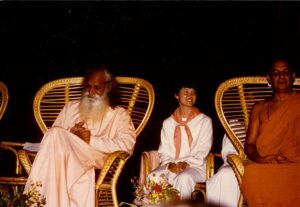In most monastic traditions, the monks take vows of obedience (along with poverty and celibacy). You obey the rule of your monastic order and the abbot (head monk of your branch of the order). What’s the benefit of obedience? Obedience teaches you to intercept the many thoughts in the mind that confuse. Self-interest motivates an endless cycle of personal likes and dislikes that direct our actions and drown out intuition. As Bala Otto, one of our school children said, “Obey mother not because she’s right, but to learn to control the mind.”
When I became a monk in 1983, I tried to obey Swami Satchidananda. But my generation wasn’t very good with obedience, and I was no exception. Over the years, my experience taught me the wisdom of obeying my Guru.

Swami Vidyananda sits between Swami Satchidananda and his brother monk, Swami Satyananda in Zinal, Switzerland, around 1982. She served as Swami Satchidananda’s French translator.
In 1984 I was traveling in Switzerland with Swami Satchidananda, acting as his French translator for a series of programs. One day he said, “Vidyananda, call the Ashram and make sure someone is there to pick me up at the airport when I return.”
I thought, “When have they EVER forgotten to pick up Swami Satchidananda?” After his legendary initial arrival in 1966, when Peter Max went to the wrong airport at the wrong time, I had never heard of that mistake happening again. Picking him up from a trip was like a party. You often got to hear anecdotes about his travels, and it was a joy just spend time with him in a small group. So, people vied for the assignment to pick him up. Nonetheless I thought I’d try to call. But my schedule that day was very busy and there was the difference in time zone, so I didn’t get a chance.
The next day Swami Satchidananda said, “Vidyananda, did you call the Ashram and make sure someone is there to pick me up at airport when I return?” I said not yet, but I’d do it soon.
This was long before the era of emails and cell phones. It was harder to make international calls. I had to go to the hotel lobby, get a phone line from the receptionist, and go through an international operator to place the call—sometimes more than once if they didn’t answer. Paying the hotel was also complicated. They had to call the operator to get the fees, and if they were busy, that took a long time. So logistically, placing the call was challenging. I didn’t get to it the next day either.
Day three: “Vidyananda, did you call the Ashram and make sure someone is there to pick me up at airport when I return?” I said not yet…
By then I was thinking, Swami Satchidananda would be travelling on to India after Europe and I was going home a month before he would arrive. So why call now? I had plenty of time to check when I got home.
The next day we went on a side trip to teach in Southern France. There it was impossible to call. As I was leaving to go to Paris for a week before heading home, he said one last time, “Please call to make sure someone is there to pick me up.” I would be home in a week, so why bother?
A week later I arrived home to JFK airport in NY and… nobody was there to pick ME up! To make matters worse, I had two heavy, big suitcases and a wheel broke on my luggage carrier right in the middle of JFK’s huge arrivals lobby. I was stranded where I couldn’t get to a phone booth or even walk to where I could conveniently sit. I assumed they were late because I had asked someone reliable to arrange my pickup. After an hour’s wait, standing in the middle of the hectic lobby, I finally struggled with my luggage and found US coins to call the IYI. Alas, nobody was on the way! My arrival had somehow fallen through the cracks. I was so tired and jet-lagged I ended up in tears.
If I had called as my Guru had repeatedly asked, they would have checked their pick-up log and said that, yes, they had arranged for Swami Satchidananda, but they would have caught that I was missing from their pick-up list and arranged a driver.
I have often wondered what went on inside of Swami Satchidananda’s mind. Did he know I would be stranded? Was there some prime directive that said he was not “allowed” to tell me he knew? Perhaps he was simply following the promptings of his intuition, which was finely attuned to higher guidance. He didn’t seem to question his intuition.
He was obeying his inner guidance, even if it was telling him to do something that seemed illogical. And it was entirely selfless in the end—it was not for his own benefit.



